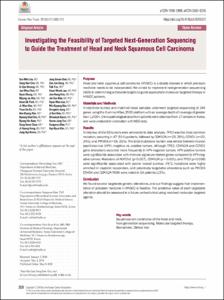KUMEL Repository
1. Journal Papers (연구논문)
1. School of Medicine (의과대학)
Dept. of Internal Medicine (내과학)
Investigating the Feasibility of Targeted Next-Generation Sequencing to Guide the Treatment of Head and Neck Squamous Cell Carcinoma
- Keimyung Author(s)
- Park, Keon Uk
- Department
- Dept. of Internal Medicine (내과학)
- Journal Title
- Cancer Research and Treatment
- Issued Date
- 2019
- Volume
- 51
- Issue
- 1
- Keyword
- Squamous cell carcinoma of the head and neck; Next-generation sequencing; Molecular targeted therapy; Biomarkers; Clinical trial
- Abstract
- Purpose
Head and neck squamous cell carcinoma (HNSCC) is a deadly disease in which precision medicine needs to be incorporated. We aimed to implement next-generation sequencing (NGS) in determining actionable targets to guide appropriate molecular targeted therapy in HNSCC patients.
Materials and Methods
Ninety-three tumors and matched blood samples underwent targeted sequencing of 244 genes using the Illumina HiSeq 2500 platform with an average depth of coverage of greater than 1,000. Clinicopathological data from patients were obtained from 17 centers in Korea, and were analyzed in correlation with NGS data.
Results
Ninety-two of the 93 tumors were amenable to data analysis. TP53 was the most common mutation, occurring in 47 (51%) patients, followed by CDKN2A (n=23, 25%), CCND1 (n=22, 24%), and PIK3CA (n=19, 21%). The total mutational burden was similar between human papillomavirus (HPV)–negative vs. positive tumors, although TP53, CDKN2A and CCND1 gene alterations occurred more frequently in HPV-negative tumors. HPV-positive tumors were significantly associated with immune signature-related genes compared to HPV-negative tumors. Mutations of NOTCH1 (p=0.027), CDKN2A (p < 0.001), and TP53 (p=0.038) were significantly associated with poorer overall survival. FAT1 mutations were highly enriched in cisplatin responders, and potentially targetable alterations such as PIK3CA E545K and CDKN2A R58X were noted in 14 patients (15%).
Conclusion
We found several targetable genetic alterations, and our findings suggest that implementation of precision medicine in HNSCC is feasible. The predictive value of each targetable alteration should be assessed in a future umbrella trial using matched molecular targeted agents.
- Keimyung Author(s)(Kor)
- 박건욱
- Publisher
- School of Medicine (의과대학)
- Citation
- Sun Min Lim et al. (2019). Investigating the Feasibility of Targeted Next-Generation Sequencing to Guide the Treatment of Head and Neck Squamous Cell Carcinoma. Cancer Research and Treatment, 51(1), 300–312. doi: 10.4143/crt.2018.012
- Type
- Article
- ISSN
- 2005-9256
- Source
- https://www.e-crt.org/journal/view.php?doi=10.4143/crt.2018.012
- Appears in Collections:
- 1. School of Medicine (의과대학) > Dept. of Internal Medicine (내과학)
- 파일 목록
-
-
Download
 oak-2019-0006.pdf
기타 데이터 / 1.77 MB / Adobe PDF
oak-2019-0006.pdf
기타 데이터 / 1.77 MB / Adobe PDF
-
Items in Repository are protected by copyright, with all rights reserved, unless otherwise indicated.